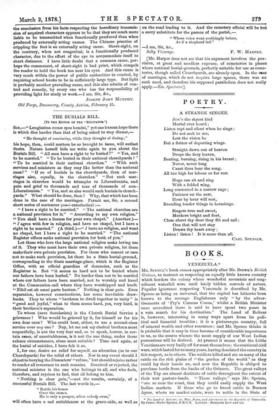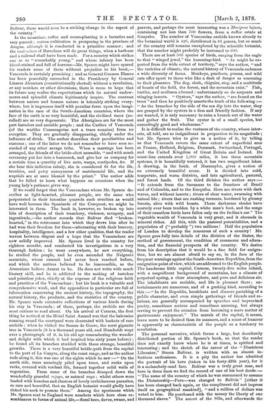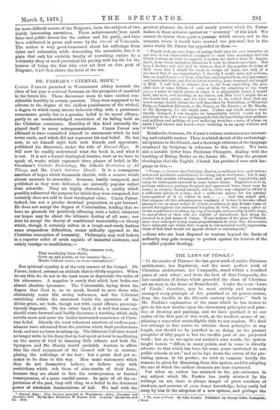BOOKS.
VENEZUELA.*
MR. SPENCE'S book comes appropriately after Mr. Brown's British Guiana, to instruct us respecting an equally little known country which borders the colony whose wonderful mountain and mag- nificent waterfall were until lately hidden marvels of nature. Popular ignorance respecting Venezuela is described by Mr. Spence as being so universal, that the capital has hitherto been known to the average Englishman only " by the adver- tisements of ' Fry's Caracas Cocoa,' whilst a British Minister once accredited there is said to have spent two years in a vain search for his destination." The Land of Bolivar is, however, interesting in many ways apart from its poli- tical and financial troubles ; it is a picturesque country, full of mineral wealth and other resources ; and Mr. Spence thinks it is probable that it may in time become of considerable importance to us, as the source whence the meat supply of our West Indian possessions will be derived. At present it seems that the Little Venetiansare very badly off for meat themselves; the continual civil wars, which lasted for so many years, having desolated the country in this respect, as in others. The soldiers killed and ate as many of the cattle on the rich plains of " the garden of the world " as they could lay their hands on, and now the Republic is obliged to purchase herds from the banks of the Orinoco. The great valleys of the Tuy are almost destitute of cattle throughout the extent of their vast pasture-lands. " These valleys," says Mr. Spence, "are so near the coast, that they could easily supply the West Indian markets. If those who go to breed cattle in Buenos Ayres, where no market exists, were to settle in the State of • The Land of BoTinzr; or, War, Peace, and Adventure in the Republic of Venezuela. By James Medic Spence, F.R.G.S. London : Sampson Low and Uo.
Bolivar, there would soon be a striking change in the aspect of the country."
In the meantime, coffee and cacao-planting is a lucrative and easy pursuit ; cotton cultivation is prospering in the province of Aragua, although it is conducted in a primitive manner ; and the coal-mines of Barcelona will do great things, when a harbour and a railroad shall have been made. For a country which strikes one as so " remarkably young," and whose infancy has been blood-stained and full of horrors—Mr. Spence might have spared his readers some of them without prejudice to his book,— Venezuela is certainly promising ; and as General Guzman Blanco has been peacefully succeeded in the Presidency by General Linares Alcantara (constitutionally elected) without a revolution, or any murders or other diversions, there is room to hope that its future may realise the expectations which its natural endow- ments and splendid climate legitimately inspire. The contrast between nature and human nature is tolerably striking every- where, but it impresses itself with peculiar force upon the imagi- nation in the case of the South-American countries, where the face of the earth is so very beautiful, and the civilised races (so- called) are so very degenerate. The Aborigines are for the most part harmless and amiable people ; and the Caribes of Venezuela (of the warlike Cumanagotas not a trace remains) form no exception. They are gradually disappearing, chiefly under the influence of drink. The author describes their peculiarities and customs ; one of the latter we do not remember to have seen re- corded of any other savage tribe. When a marriage has been arranged, the friends of the bride-elect assemble, " and with much ceremony put her into a hammock, and give her as company for a certain time a quantity of live ants, wasps, centipedes, &c. If she bear this infliction calmly, she is considered fit for the ills, troubles, and petty annoyances of matrimonial life, and the nuptials are at once blessed by the priest." The author adds that he failed to learn what happens on occasions when the young lady's patience gives way.
If we could forget that the Venezuelans whom Mr. Spence de- scribes as light-hearted, pleasant people, are the same who perpetrated in their intestine quarrels such cruelties as would have well become the Spaniards of the Conquest, we might be interested in them. The book is, however, so broken up into bits of description of their treachery, violence, savagery, and ingratitude,—the author records that Bolivar died "broken- hearted," in the retirement into which they drove him after he had won their freedom for them—alternating with their bravery, hospitality, intelligence, and a few other qualities, that the reader wavers between disgust and a hope that the Venezuelans are now solidly improved. Mr. Spence lived in the country for eighteen months, and conducted his investigations in a very thorough fashion ; be went everywhere, he saw everything, he studied the people, and he even ascended the Naiguata mountain, whose summit had never been reached before, and which the natives believed to be inaccessible, as the Armenians believe Ararat to be. He does not write with much literary skill, and he is addicted to the making of tasteless and pointless jokes, chiefly at the expense of the religious faith and practices of the Venezuelans ; but his book is a valuable and comprehensive work, and the appendices in particular are full of information concerning the ancient history, the topography, the natural history, the products, and the statistics of the country. Mr. Spence made extensive collections of various kinds during his stay in Venezuela ; of these, perhaps, the orchids are the most curious to read about. On his arrival at Caracas, the first thing he noticed at the Hotel Saint Amand was that the balconies running round the courtyard were decorated with baskets of rare orchids ; when he visited the Saman de Giiere, the most gigantic tree in Venezuela (it is a thousand years old, and Humboldt wept over a photograph of it, in his old age remembering the wonder and delight with which it had inspired him sixty years before) ; he found all its branches studded with these strange, beautiful growths. There is a very beautiful bridle-path from the capital to the port of La Guayra, along the coast range, and as the author rode along it, this was one of the sights which he saw :—" On the north side, trees seemingly piled upon trees, and rocks upon rocks, covered with verdant life, formed together solid walls of vegetation. From some of the branches drooped down the wonderfully graceful vejuga, or natural rope ; whilst others were loaded with bunches and clusters of lovely orchidaceous parasites, so rare and beautiful, that an English botanist would gladly have risked his neck to possess them." Among the specimens which Mr. Spence sent to England were numbers which bore close re- semblances to forms of animal life,—floral bees, doves, swans, and parrots, and perhaps the most interesting was a Mariposa bejuca,. containing not less than 700 flowers, from a coffee estate at Guayabo. The number of Venezuelan orchids known already to. the botanical world is 426, distributed in 81 genera, but so much of the country still remains unexplored by the scientific botanist, that the number might probably be increased to 600.
There are at least 500 species of birds, ranging from the eagle to that "winged jewel," the humming-bird. "As might be ex- pected from the wide extent of territory," says the author, " and the varieties of climate, the natural history of Venezuela embraces a wide diversity of fauna. Monkeys, panthers, pumas, and wild cats offer sport to those who like a dash of danger as seasoning to their pleasures. The dog, sloth, chiguire, stag, and a multitude of beasts of the field, the forest, and the mountain exist." Fish, turtles, and mollusca abound ; unfortunately so do serpents and stinging insects. " Oysters," says the author, " are found on the trees " and then he positively asserts the truth of the following :- " As the branches by the side of the sea dip into the water, they are grasped by the oysters in a firm and friendly fashion. If any are wanted, it is only necessary to raise a branch out of the water and gather the fruit. The oyster is of a small species, but exceedingly good and wholesome."
It is difficult to realise the vastness of the country, whose inter- ests, all told, are so insignificant in proportion to its magnitude ; but Mr. Spence tries to give us a notion of it, by telling us that Venezuela covers the same extent of superficial area
France, Holland, Belgium, Denmark, Switzerland, Portugal, and the United Kingdom of Great Britain and Ireland. lts- coast-line extends over 1,000 miles, it has three mountain systems, it is bountifully watered, it has two magnificent lakes. A drawing, in the book, of Maracaybo, gives a notion of an extremely beautiful scene. It is divided into cold, temperate, and warm districts, and into agricultural, pastoral, and forest lands. Of the third division the author says :— " It extends from the Savannas to the frontiers of BraziP and of Columbia, and to the Esequibo. Here are rivers with dark waves, and without insects ; rivers of clear water, swarming with animal life ; rivers that are rushing torrents, bordered by gloomy forests, alive with wild beasts. Those darksome shades have scarcely ever been trodden by a white man's foot, and the songs of their countless birds have fallen only on the Indian's ear." The vegetable wealth of Venezuela is very great, and it abounds in mineral riches. All this, with the pastoral potentialities, and a population of (" probably ") two millions ! Half the population• of London to develop the resources of such a country ! Mr. Spence goes fully into details of the division of the States, the- method of government, the condition of commerce and educa- tion, and the financial prospects of the country. We derive from his description that it would be a fine field for emigra- tion, but we are almost afraid to say so, in the face of the frequent warnings against the South-American Republics, from the emigration point of view, which are addressed to the English people. The handsome little capital, Caracas, twenty-five miles inland, with a magnificent background of mountains, has a climate of perpetual spring, a clear atmosphere, and pure and delicious air. The inhabitants are sociable, and life is pleasant there ; en- tertainments are numerous, and of a gushing kind, according to this :—" In the Republic, breakfasts and dinners partaking of a public character, and even simple gatherings of friends and re- lations, are generally accompanied by speeches and improvised poetry, sometimes serious and sometimes amusing, but always serving to prevent the occasion from becoming a mere matter of gastronomic enjoyment." The morals of the capital, it seems,. leave more to be desired than its manners, and a sense of humour is apparently as characteristic of the people as a tendency to. revolution.
The personal narrative, which forms a large, but desultorily distributed portion of Mr. Spence's book, so that the reader does not exactly know where he is at times, is spirited and interesting ; and the sketch of the career of the " Illustrious Liberator," Simon Bolivar, is written with an almost in- fectious enthusiasm. It is a pity the author has admitted the portrait of his hero (taken in his forty-fifth year), for it is a melancholy-mad face. Bolivar was a truly great man, and here in three lines we find the record of one of his best deeds :- " The name of the country of which he was summoned to assume the Dictatorship—Peru—was changed to Bolivia" [either it has been changed back again, or the compliment did not impress itself on geographical mankind], " and a million of dollars was voted to him. He purchased with the money the liberty of one thousand slaves." The ascent of the Silla, and afterwards the
far more difficult ascent of the Naiguatti, form the subjects of two highly interesting narratives. These achievements ',won much fame and public favour for the author and his_ party, and have been celebrated in prose and verse by the literati of Venezuela. The author is very good-humoured about his sufferings from thirst and exhaustion while descending the mountain, but it is plain that only his enviable faculty of recruiting nature by a voluntary sleep at need prevented his paying with his life for the honour of being the first who ever set foot on that peak of Naiguatil, 9,430 feet above the level of the sea.




































 Previous page
Previous page